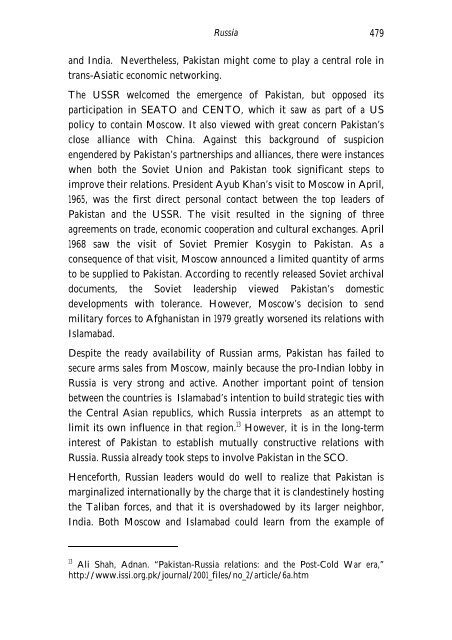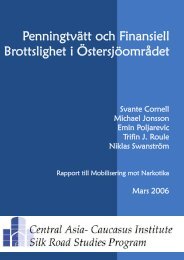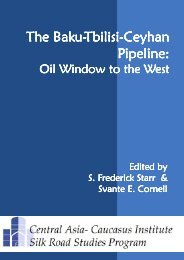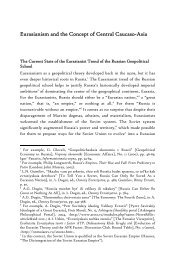Russia - Central Asia-Caucasus Institute and Silk Road Studies ...
Russia - Central Asia-Caucasus Institute and Silk Road Studies ...
Russia - Central Asia-Caucasus Institute and Silk Road Studies ...
You also want an ePaper? Increase the reach of your titles
YUMPU automatically turns print PDFs into web optimized ePapers that Google loves.
<strong>Russia</strong> 479<br />
<strong>and</strong> India. Nevertheless, Pakistan might come to play a central role in<br />
trans-<strong>Asia</strong>tic economic networking.<br />
The USSR welcomed the emergence of Pakistan, but opposed its<br />
participation in SEATO <strong>and</strong> CENTO, which it saw as part of a US<br />
policy to contain Moscow. It also viewed with great concern Pakistan’s<br />
close alliance with China. Against this background of suspicion<br />
engendered by Pakistan’s partnerships <strong>and</strong> alliances, there were instances<br />
when both the Soviet Union <strong>and</strong> Pakistan took significant steps to<br />
improve their relations. President Ayub Khan’s visit to Moscow in April,<br />
1965, was the first direct personal contact between the top leaders of<br />
Pakistan <strong>and</strong> the USSR. The visit resulted in the signing of three<br />
agreements on trade, economic cooperation <strong>and</strong> cultural exchanges. April<br />
1968 saw the visit of Soviet Premier Kosygin to Pakistan. As a<br />
consequence of that visit, Moscow announced a limited quantity of arms<br />
to be supplied to Pakistan. According to recently released Soviet archival<br />
documents, the Soviet leadership viewed Pakistan’s domestic<br />
developments with tolerance. However, Moscow’s decision to send<br />
military forces to Afghanistan in 1979 greatly worsened its relations with<br />
Islamabad.<br />
Despite the ready availability of <strong>Russia</strong>n arms, Pakistan has failed to<br />
secure arms sales from Moscow, mainly because the pro-Indian lobby in<br />
<strong>Russia</strong> is very strong <strong>and</strong> active. Another important point of tension<br />
between the countries is Islamabad’s intention to build strategic ties with<br />
the <strong>Central</strong> <strong>Asia</strong>n republics, which <strong>Russia</strong> interprets as an attempt to<br />
limit its own influence in that region. 13 However, it is in the long-term<br />
interest of Pakistan to establish mutually constructive relations with<br />
<strong>Russia</strong>. <strong>Russia</strong> already took steps to involve Pakistan in the SCO.<br />
Henceforth, <strong>Russia</strong>n leaders would do well to realize that Pakistan is<br />
marginalized internationally by the charge that it is cl<strong>and</strong>estinely hosting<br />
the Taliban forces, <strong>and</strong> that it is overshadowed by its larger neighbor,<br />
India. Both Moscow <strong>and</strong> Islamabad could learn from the example of<br />
13 Ali Shah, Adnan. “Pakistan-<strong>Russia</strong> relations: <strong>and</strong> the Post-Cold War era,”<br />
http://www.issi.org.pk/journal/2001_files/no_2/article/6a.htm






